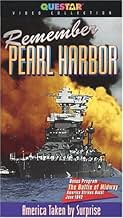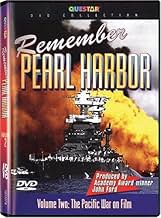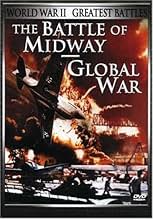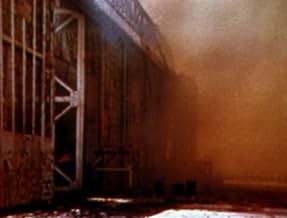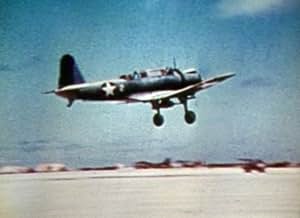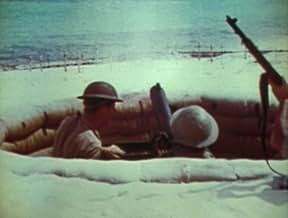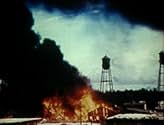AVALIAÇÃO DA IMDb
6,1/10
2,4 mil
SUA AVALIAÇÃO
Adicionar um enredo no seu idiomaThe Japanese attack on Midway in June 1942, filmed as it happened.The Japanese attack on Midway in June 1942, filmed as it happened.The Japanese attack on Midway in June 1942, filmed as it happened.
- Direção
- Roteiristas
- Artistas
- Ganhou 1 Oscar
- 1 vitória no total
Henry Fonda
- Narrator
- (narração)
Jane Darwell
- Narrator
- (narração)
James Roosevelt
- Self - US Army Major
- (as Major Roosevelt)
Donald Crisp
- Main Narrator
- (narração)
- (não creditado)
Irving Pichel
- Narrator
- (narração)
- (não creditado)
Jimmie Thach
- Self - Naval Aviator
- (não creditado)
- Direção
- Roteiristas
- Elenco e equipe completos
- Produção, bilheteria e muito mais no IMDbPro
Avaliações em destaque
There have been many battles in the Second World War that played a part in deciding who the victors of the conflict were going to be, and one of these engagements is known as the Battle of Midway. Like any good ww2 film, this short combines good narration with impressive archive footage that was taken while the battle was ongoing. If that weren't enough, John Ford, one of the greatest geniuses in cinema history, directed this. The film starts with the narrator, Donald Crisp, telling the audience where Midway Island is located and why it holds such significance to the United States military. The film then goes on to show footage of the event that has often been cited as one of the most successful military engagements ever. At Midway, Japanese forces took 20 times the amount of casualties the Americans did, and american carrier aircraft managed to sink all 4 of the aircraft carriers responsible for attacking Pearl Harbor half a year earlier. This all took place only in June 1942, but even just 6 months into America's involvement in the war, they dealt a blow to japan from which they never really recovered. The footage of this event that Ford captured is remarkable because he was so close to the action. Many marines and other servicemen were killed on the island as japanese planes attacked from every conceivable angle, but Ford kept filming. You can see proof of this at one part where the camera gets knocked over by some kind of explosion. Aside from the exciting footage of combat and naval warfare, there isn't too much else to this short. It deserves praise because John Ford risked dying in action in order to record most of it, but at the same time, it's been eclipsed by a lot of other world war 2 related films that also showcase footage of this battle. What makes this one stand out after so many decades is the fact that its director was actually there in the midst of it, something that no modern documentary can boast. Because of this (and the huge interest I have in ww2 things) I have to consider Battle of Midway as one of the most iconic and well made second world war films. It goes without saying that this won an Oscar as well.
This is a great, short (less than 20 minutes)film of one part of the key battle of the war in the Pacific. Keep it mind, the Battle of Midway was fought in early June, 1942. The darkest days of the Pacific War for America. Pearl Harbor, the Phillipines, Bataan, Corregidor, Wake Island; all American defeats. It is, indeed, a "propaganda" film. Or, at least it was turned into one after John Ford shot it. But the film of the combat itself is no propaganda piece. It took a lot of courage for Ford to stick his cameras out and film while hundreds of Japanese planes struck the island. Many Marines died in the bombing. Ford could easily have been killed. Of necessity, Ford could only film the land portion of the battle, which was an attempt by Japanese naval forces to reduce the island's defenses and then conduct a landing, possibly eventually putting Hawaii in jeopardy with a new, forward Japanese base on Midway. The major part of the battle was a naval battle between carrier forces. An "incredible victory" in the title of the Walter Lord book. Four Japanese aircraft carriers, miles from the filming on Midway itself, were sunk. It was the begging of the end of Japan. The stiff resistance put up by the Marines on Midway, captured by Ford, forced decisions by the Japanese High Command that ultimately led to the sinking of their carriers. Historically interesting film.
Director John Ford had no idea what he was in for when he headed to Midway Island in the late spring of '42, the first year of the United States' involvement in World War Two. For a man looking for action he certainly ended up in the right place at the right time, producing the first documentary capturing American troops in combat in the Oscar-winning September 1942 "The Battle of Midway."
The 18-minute film, shot in color, was a pivotal naval and air engagement in the first year of the Pacific conflict. But the production wasn't planned ahead of time by Ford, a future four-time Oscar-winning Best Director. As a United States Navy Reserve officer, Ford, 47, headed the photographic unit for the Office of Strategic Services, and was on assignment on a secret mission to the island of Midway. "Our job was to photograph both for the records and for our intelligence assessment, the work of guerrillas, saboteurs, Resistance outfits," described Ford later on his unit's responsibilities. After stopping off at Pearl Harbor in Hawaii to photograph the damage at the naval base, Ford volunteered to be shipped to the remote Pacific island of Midway to document the progress of the submarine base being built on the atoll. Unbeknownst to Ford, the Japanese were setting their sights on capturing the air base on Midway.
Accompanied by U. S. Navy photographer Jack MacKenzie, a former RKO assistant cameraman, Ford was filming much of the island's preparations when he heard about the Japanese fleet approaching the region-and the United States' plans to ambush it on June 4, 1942. The commanding officer of the island base, Captain Cyril Simard, told Ford, "Forget the pictures as much as you can. But I want a good accurate account of the bombing. We expect to be attacked tomorrow." Ford sought the island's highest point, a power station on the base. He situated MacKenzie and himself there equipped with two 16mm cameras and Kodachrome color film stock. Another film crew was stationed on one of the attacking carriers, the USS Hornet, to record all the sea action.
Once the Japanese Zeros appeared over the horizon, Ford and MacKenzie began cranking their cameras. Being high up posed an enormous danger to the pair. "The image jumps a lot because the grenades were exploding right next to me," Ford recalled in 1966. "Since then, they do that on purpose, shaking the cameras when filming war scenes. For me it was authentic because the shells were exploding at my feet." One bomb knocked the two down, slicing a deep gash in Ford's arm-from which he earned a Purple Heart. "It's where the plane flies over the hangar and everything goes up in smoke and debris, you can see one big chunk coming for the camera," described Ford.
The pair reeled off four hours of silent footage. After the monumental battle, they left immediately for Los Angeles. Ford knew he captured a ton of action which could make for an exciting documentary. Combining what was filmed on the island and those shot on the USS Hornet, he handed all the reels to editor Robert Parrish, who had assisted Ford in 1941's "How Green Was My Valley." Two scriptwriters shaped the narrative with Ford, voiced by actors Henry Fonda, Jane Darwell and Donald Crisp. Alfred Newman, the music director for 20th Century Fox, composed the patriotic soundtrack. Ford mixed special sound effects from the studio's library to add to the excitement of the documentary. In six short days, the picture was ready. But working for the OSS, Ford was suspicious the military would suppress the movie. Arranging a private screening at the White House with Franklin Roosevelt in attendance, Ford cleverly inserted a clip of president's son, Major James Roosevelt of the Marine Corps, who was overseeing the memorial service on the island soon after the battle. The impact at the conclusion when the segment was show was quite emotional for the Roosevelts. "When the lights came up, Mrs. Roosevelt was crying," Parrish in attendance noticed. "The president turned to Admiral Leahy and said, 'I want every mother in America to see this picture'." With that "The Battle of Midway" was released nationwide, with many viewers teary-eyed leaving the theaters The Academy Awards had established the Best Documentary for the first time, handing out four separate Oscars during its 15th annual ceremonies, the only time multiple awards were given in one category. "The Battle of Midway" was one of six Oscars Ford received in his lifetime.
Accompanied by U. S. Navy photographer Jack MacKenzie, a former RKO assistant cameraman, Ford was filming much of the island's preparations when he heard about the Japanese fleet approaching the region-and the United States' plans to ambush it on June 4, 1942. The commanding officer of the island base, Captain Cyril Simard, told Ford, "Forget the pictures as much as you can. But I want a good accurate account of the bombing. We expect to be attacked tomorrow." Ford sought the island's highest point, a power station on the base. He situated MacKenzie and himself there equipped with two 16mm cameras and Kodachrome color film stock. Another film crew was stationed on one of the attacking carriers, the USS Hornet, to record all the sea action.
Once the Japanese Zeros appeared over the horizon, Ford and MacKenzie began cranking their cameras. Being high up posed an enormous danger to the pair. "The image jumps a lot because the grenades were exploding right next to me," Ford recalled in 1966. "Since then, they do that on purpose, shaking the cameras when filming war scenes. For me it was authentic because the shells were exploding at my feet." One bomb knocked the two down, slicing a deep gash in Ford's arm-from which he earned a Purple Heart. "It's where the plane flies over the hangar and everything goes up in smoke and debris, you can see one big chunk coming for the camera," described Ford.
The pair reeled off four hours of silent footage. After the monumental battle, they left immediately for Los Angeles. Ford knew he captured a ton of action which could make for an exciting documentary. Combining what was filmed on the island and those shot on the USS Hornet, he handed all the reels to editor Robert Parrish, who had assisted Ford in 1941's "How Green Was My Valley." Two scriptwriters shaped the narrative with Ford, voiced by actors Henry Fonda, Jane Darwell and Donald Crisp. Alfred Newman, the music director for 20th Century Fox, composed the patriotic soundtrack. Ford mixed special sound effects from the studio's library to add to the excitement of the documentary. In six short days, the picture was ready. But working for the OSS, Ford was suspicious the military would suppress the movie. Arranging a private screening at the White House with Franklin Roosevelt in attendance, Ford cleverly inserted a clip of president's son, Major James Roosevelt of the Marine Corps, who was overseeing the memorial service on the island soon after the battle. The impact at the conclusion when the segment was show was quite emotional for the Roosevelts. "When the lights came up, Mrs. Roosevelt was crying," Parrish in attendance noticed. "The president turned to Admiral Leahy and said, 'I want every mother in America to see this picture'." With that "The Battle of Midway" was released nationwide, with many viewers teary-eyed leaving the theaters The Academy Awards had established the Best Documentary for the first time, handing out four separate Oscars during its 15th annual ceremonies, the only time multiple awards were given in one category. "The Battle of Midway" was one of six Oscars Ford received in his lifetime.
This short piece of film shows parts of, as the title already tells us, of the battle of Midway, and some moments after it. The director is John Ford and what he creates with this short documentary is pure Hollywood war propaganda. There is a storyline that even includes the women at home waiting for the fighters. During some scenes a dialogue between Jane Darwell and the great Henry Fonda is heard on the background.
The images of the battle, shot in color, have historic value and are pretty exciting. The heroic tone is easy to understand, although now it is easy to see past that. Everything, including its Oscar win, seems to be there for propaganda purposes, making the people at home feel good enough about the war that is going on. In the end 'The Battle of Midway' is an interesting little film, but not that much more.
The images of the battle, shot in color, have historic value and are pretty exciting. The heroic tone is easy to understand, although now it is easy to see past that. Everything, including its Oscar win, seems to be there for propaganda purposes, making the people at home feel good enough about the war that is going on. In the end 'The Battle of Midway' is an interesting little film, but not that much more.
A documentary short, directed by John Ford. Covers the Battle of Midway, one of the most decisive battles of WW2. Taking place near the island of Midway in the central Pacific in June 1942, the battle turned the tide of the Pacific Theatre. Ford uses actual footage from the battle and the aftermath, with narration by Henry Fonda.
During WW2 the US used its mighty film industry to its advantage, producing high-quality news reels. documentaries and propaganda films. For this they enlisted some of the foremost directors of the age: Frank Capra, William Wyler, John Huston, John Sturges and John Ford, among others. Here, John Ford (or should I say, Lt. Commander John Ford, USNR) does his bit.
He does fairly well, capturing some great footage of the battle. It is more the editing and over-the-top, hammy added-on dialogue that weaken the film, and only when viewed with a 21st century lens. Propaganda films never have the same impact when viewed outside of wartime.
The movie went on to win the Best Documentary Oscar in 1943.
During WW2 the US used its mighty film industry to its advantage, producing high-quality news reels. documentaries and propaganda films. For this they enlisted some of the foremost directors of the age: Frank Capra, William Wyler, John Huston, John Sturges and John Ford, among others. Here, John Ford (or should I say, Lt. Commander John Ford, USNR) does his bit.
He does fairly well, capturing some great footage of the battle. It is more the editing and over-the-top, hammy added-on dialogue that weaken the film, and only when viewed with a 21st century lens. Propaganda films never have the same impact when viewed outside of wartime.
The movie went on to win the Best Documentary Oscar in 1943.
Você sabia?
- CuriosidadesDirector John Ford and cinematographer Joseph H. August were wounded by enemy fire while filming the battle.
- Citações
Main Narrator: Midway Island. Not much land right enough, but it's our outpost. Your front yard.
- ConexõesEdited into Ils ont filmé la guerre en couleur (2000)
- Trilhas sonorasAmerica, My Country Tis of Thee
(1832) (uncredited)
Music by Lowell Mason, based on the Music by Henry Carey from "God Save the King" (1744)
Words by Samuel F. Smith
Played in the score and later sung by an offscreen chorus
Principais escolhas
Faça login para avaliar e ver a lista de recomendações personalizadas
Detalhes
- Tempo de duração
- 18 min
- Mixagem de som
- Proporção
- 1.37 : 1
Contribua para esta página
Sugerir uma alteração ou adicionar conteúdo ausente


